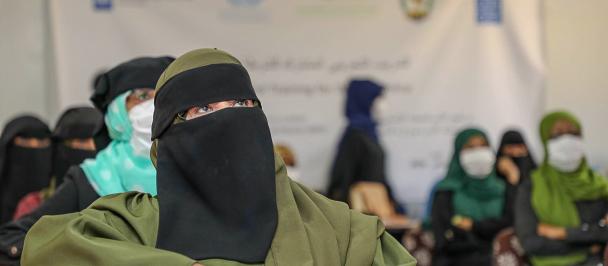Does the performance of government matter for peacebuilding? UNDP strongly believes so. Crucially, good governance can ensure that peace lasts by addressing root causes of tension and making sure that all citizens feel that their needs and interests are fairly represented.
If the underlying factors that threaten peace in the first place are not addressed, tensions risk continuing to simmer, even if progress is made. Recognizing this, UNDP supports governance strengthening in more than 170 countries by providing integrated policy and programmatic support through catalytic funding, technical assistance, rapid diagnostic assessments and quality assurance.
In Yemen, where 80 percent of the population depend on humanitarian assistance, UNDP has partnered with UNICEF, WHO and the World Bank to help build the resilience of local institutions to restore responsive, accountable and inclusive governance by ensuring effective service delivery and restoring public trust in core governance institutions that leave no one behind.
In Honduras, UNDP implemented a US$1.7 million initiative funded by the Peacebuilding Fund, in collaboration with Department of Political and Peacebuilding Affairs and Office of the United Nations High Commissioner for Human Rights, to facilitate a national dialogue on key peacebuilding priorities to promote more inclusive social cohesion in the country.
Providing support to national and local government creates a foundation for sustainable development at country levels. But how is good governance defined?
UNDP defines good governance as governing systems that are capable, responsive, inclusive, and transparent. UNDP works closely with governments to strengthen public institutions, help fight corruption and support inclusive participation. This support is particularly crucial in countries affected by fragility, violence and conflict where basic service delivery and risk response capacity is reducing and will be difficult to reclaim after the end of the crisis.
In Sudan, UNDP is working together with the United Kingdom and European Union to strengthen the capacities of the Prime Minister’s Executive Office and government institutions tasked with consolidating peace, ensuring economic recovery and leading a transition to democratic governance in response to the voices of the Sudan’s youthful and peaceful transformation.
There are dozens of indices that analyze the performance of governments, such as the World Governance Index and the Sustainable Governance Indicator. The BTI Governance Index is considered one of the most comprehensive analyses of public sector performance, as it is derived from three qualitative and three quantitative indicators. It ranks countries according to their leadership’s performance to measure successes and setbacks against the selected criteria including democracy, political management based on the rule of law, and a socially responsible market economy.
The 10 lowest-performing countries in the 2018 BTI include Somalia, Syria and Yemen, which suffer from ongoing conflict. So, what is the relationship between conflict and governance? When a comparison is made between the Global Peace Index and the BTI, interestingly, seven of the same countries are present in 2018.

Countries that are ranked among the lowest 10 in both BTI and Global Peace Index are either experiencing ongoing conflicts or have experienced one recently (except for Russia). This comparison tells us that there is a correlation between peace and governance; the recently published Thematic Paper for the UN Secretary General’s 2020 Report on Sustaining Peace and Peacebuilding also articulates this link, stating peace depends on the quality of the governance, and the quality of governance can be affected by peace.
UNDP Administrator Achim Steiner also recently stressed the correlation between peace and governance in his remarks to the Peacebuilding Commission, emphasizing the importance of “investing in SDG 16 – the enabling, institutions Goal – and the gaps in integrated responses on the ground”.
Conflict can be a major obstacle to good governance. However, in 2016, only two percent of Official Development Assistance in fragile contexts was directed to conflict prevention/peacebuilding, even though Global Peace Index indicates that the world has become less peaceful during the past decade. Conflict is a clear matter of governance, and a government can be a major force for peace given its responsibility for the administration of the country’s budget, as well as management of overseas development assistance (ODA).
It is obvious that weak governance can contribute to conflict – and vice-versa. Effective public sector management is essential for conflict prevention, peacebuilding and beyond such as sufficient response to the COVID-19 on behalf of the citizens. Also, given only two percent of the ODA budget is allocated to conflict prevention and peacebuilding in fragile countries, donors and aid agencies should consider investing more in improving governance performance to pursue long-term sustainable development goals and achieve sustained peace.

 Locations
Locations
